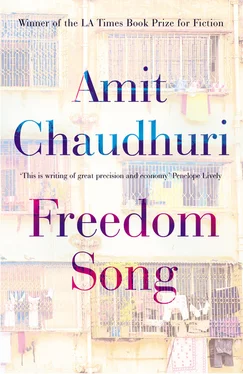School had begun again, the first troubles were behind them, and, in addition to the faint moustache that had formed on Mohit’s upper lip and proclaimed his gradual farewell to childhood, the educational system had thrown further responsibility on his young shoulders, forcing him to study each day for the finals one and a half years away, giving him a seriousness beyond his years. After that, a brief respite, and then the upper matriculation, the Joint Entrance. . Only ten days ago he’d been cycling from house to relative’s house in the morning. Now his eyes were a little red, because he’d been studying late into the night the past few days. All that had happened before — the end of the tests, the curfew, the troubles far away in Ayodhya, the visit to Bhaskar’s house — seemed vague and dreamlike, and the days now, taken up with work and preparation, seemed like a world of perpetual wakefulness.
He was an only child; as was his cousin Sameer. That was neither an accident nor coincidence. Their parents had planned it this way. No more large untidy families like Bhola’s; they would devote all their attention to their one child.
Khuku said to Mini: ‘I’ve never seen anyone who studies quite so hard as Mohit. He wakes up at five in the morning. .’ She shuddered, because she’d hated studies at school; but Mini, being a schoolteacher, looked impressed.
Puti would converse with Mohit as if he were a grown-up. And in some ways, he was — with his father away on tours he often substituted as the ‘man’ in the house. And yet he was shorter than he should be at his age, and was any day expected to shoot up.
‘Why not?’
‘Do I have to answer that? You know that next year is your “final” year.’
The year of the ‘final’—it had been waiting for him, it seemed, like a mythical mountain, always there, but coming nearer and nearer; and now it was in sight.
‘And time will fly.’
‘I couldn’t study the way he does,’ said Khuku to Mini after a few moments. ‘That boy is ambitious and knows how to look after himself. Unlike that other idiot, Sameer. .’
Last year his grandmother — Khuku’s elder sister — had died. (That had been a few months after Bhaskar, to the bemusement of all, had joined the Party and even Mohit’s grandmother had heard and whispered her disbelief.) There had been a sleepless air at home as she had lapsed into a coma, then passed away, then been taken away to the crematorium. It had been something like it was now, with the exams coming up — the confusion of a proper sense of time, the feeling that someone familiar had suddenly gone away, the strange sense that the absence was temporary. It was still strange that his grandmother, who had hardly moved for the last two years of her life, should have left and never returned. Meanwhile, he swotted for his exams and his eyes hurt. A year ago, his mother’s eyes had become red with a brief but intense burst of weeping when his grandmother had died, but he had been unable to shed a tear.
But now he was bargaining for something else, something of possible interest; his Bhaskarmama had asked him to come to a rehearsal, probably give them a hand; ‘We’re busy and we need some help,’ he’d said in a way that made Mohit feel an old tenderness towards him, ‘and we need to get a message across.’ And of course it was a message of great and pressing importance. This feeling of tenderness, which might turn into something more serious, even a commitment, was precisely what his mother wanted to preclude; moreover, there was no time now for anything but studies; secondly, there is no doubt that the young are impressionable at certain moments in their lives, although his mother had every confidence in her son’s essential, practicable level-headedness.
Yet this city that Mohit had been born into seemed sometimes like a bad dream to Puti, with posters, and endless peeling political messages on the walls.
He was still awkward with girls. But he would not be here long. Little did he know that two years from now he would be in America. Around him, the city decayed. This boyhood, of private tutorials, practising maths questions from past question papers, of being in the school quiz team (only the other day he’d represented his school, with three others, at Don Bosco), of playing football in the parking lot in the corner, of visiting Bhola dadu’s house and eating pithha, none of it would last long. It would give way to a brief adolescence and then he would be gone to America, where his uncle was. Before long he’d sit for his Scholastic Aptitude Test.
Childhoods were terribly brief these days.
Often, when Mini sat late in the afternoon on one corner of the sofa, and she shut her book and looked up, facing the veranda, she would see the sun setting in the right-hand corner. The sky glowed red, as if at the slow aftermath of a conflagration. These, the last days in Khuku’s house.
Almost as if she were exploring a house she did not know very well, she got up and began to walk — she came out into the space of the dining-room, and went past the table.
Khuku must be sleeping inside. Any moment she would be out here.
The doctor at the nursing home (what was his name — Sarkar? — he wouldn’t be over thirty) had told her, without force, but not without a doctor-like gravity, she should begin to do some exercises immediately (‘Just once or twice a day, mashima,’ he’d said). It was a matter of how best to treat this leg, newly healing: it was almost as bewildered, tentative, and over-confident as a child, and she must give it rest but it must learn to walk again as well. She was going nowhere — just turning round the dining-table and returning to where she had started.
The pain was gone; she noticed this. It was almost gone. She was lulled by a vortex of calm, the familiarity and spaciousness of Khuku’s flat. And yet this flat, full of pretty things and tinkling curios, was both a second home and a cave of wonder to her, so unlike any other place in Calcutta, so that sometimes it seemed to her she’d suddenly woken up to it, to a brief sojourn, had been borne here in her sleep without being conscious of the journey.
She continued walking, as the sun ebbed outside.
Mini had suddenly come to Khuku’s mind last month, in December; like a sudden pressure on Khuku’s conscience; a few days, as it happened, after the troubles in Ayodhya. Mini had explained to her on the phone that she hadn’t been able to go to school for two days because of the pain from her arthritis.
And she’d temporarily become preoccupied with the idea of bringing her to her house; till in a few days she succumbed to the pull that her friend was exerting on her unconsciously.
‘Let me bring Mini here,’ Khuku had said to Shib. ‘And then I can look for a doctor. I think the main problem is that she doesn’t get a moment’s rest and,’ she smiled slightly, ‘she’s really past retirement age despite what it says in her documents. She’s younger than her real age by five years in her documents.’
‘How do you know?’ Shib couldn’t remember what her real age was.
‘She told me herself, of course. It was done years ago. I think she’s forgotten herself that she’s older than she’s supposed to be.’
‘See if you can persuade her,’ he had replied at last. For he too was fond of Mini; he’d known her when she was a girl in a frock.
Persuading Mini was never easy; it was like a gentle but strenuous tug of war.
‘No, Khuku.’
‘But I won’t hear of anything else.’
For Khuku could be stubborn as well, and Mini discovered she had no answer to that stubbornness.
That had been a particularly empty time. For the seven days of the curfew the country had been like a conch whose roar you could hear only if you put your ear to it.
Читать дальше












